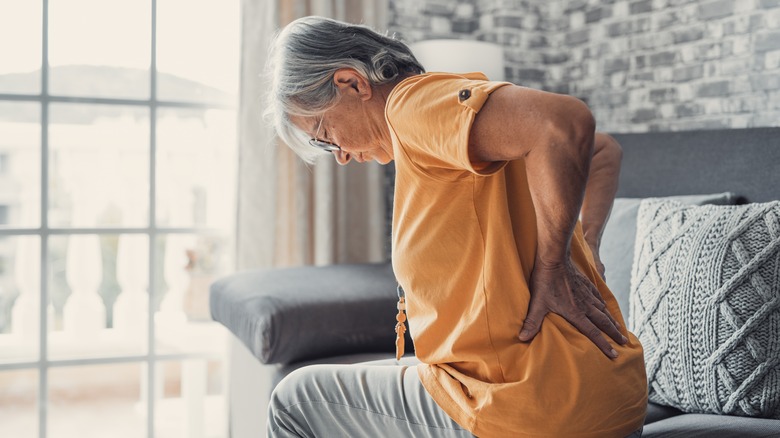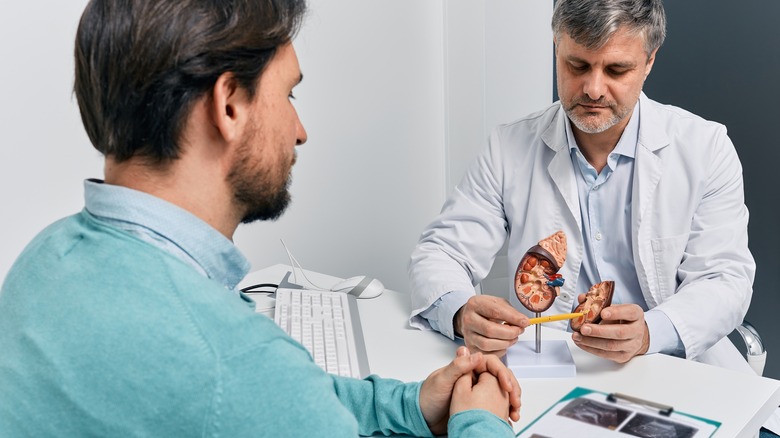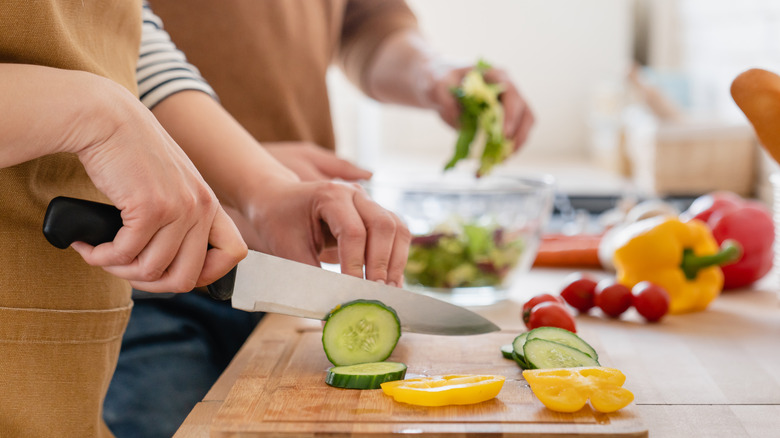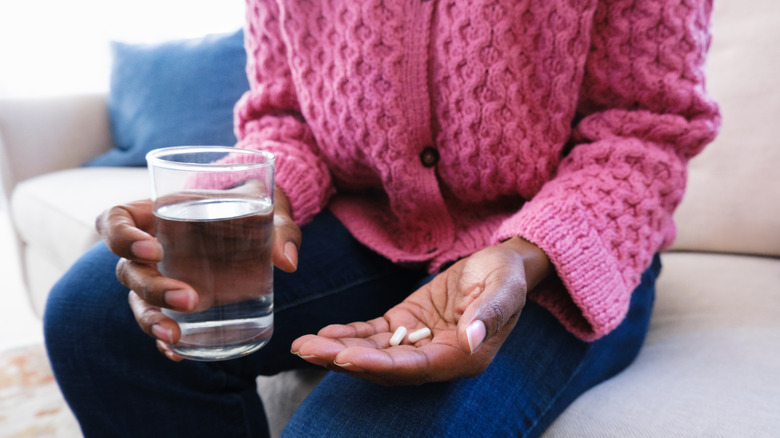What Happens To Your Kidney Stone Risk When You're 50 Or Older
We may receive a commission on purchases made from links.
You might wince just hearing the words "kidney stones," particularly if you've had one. (Spoiler alert: They can be painful.)
Kidney stones form in your kidneys when deposits of calcium and other minerals begin to build up, stick to each other, and form what we call stones. They start small and can get bigger. While kidney stones typically cause few problems at first, they can begin to cause serious, even debilitating, side effects if they dislodge, enter the ureter canal, and cause a blockage of urine flow between the kidneys and bladder. At that point, you might feel classic kidney stone symptoms like pains in your back, as explained by the Mayo Clinic, or you might become feverish or nauseated.
Fortunately, most kidney stones can be naturally "passed" through urination (a typically unpleasant, albeit effective elimination process.) If a kidney stone doesn't pass on its own, doctors may have to break the stones or perform surgery.
Although anyone can get kidney stones, people in their 50s and beyond are statistically more likely to experience them. To find out why, Health Digest partnered with Dr. Scott Noorda, a longevity physician. Dr. Noorda gave us an exclusive insider look into what makes kidney stone diagnoses more prevalent in older adults.
Kidney stone risk goes up when you're older than 50
According to Dr. Noorda, several factors contribute to an increased risk of kidney stones in 50-somethings. As we age, the risk of kidney stones increases due to decreased kidney function, hormonal shifts, and a higher likelihood of dehydration and metabolic conditions like insulin resistance. Both men and women are affected, with the risk rising significantly after age 40."
Dr. Noorda added that "kidney efficiency tends to decline with age, leading to reduced ability to properly filter out waste products, including calcium, oxalates, and uric acid, which can crystallize and form stones." He noted that while postmenopausal women are especially vulnerable to kidney stone development due to hormonal shifts such as lower estrogen levels, which can lead to higher concentrations of calcium in their urine, men aren't immune from hormone-associated kidney stones. As men age, they tend to undergo testosterone changes that can affect stone formation.
Medication use can be another reason that older adults are more apt to have kidney stones. From diuretics to antacids, drugs that are commonly prescribed to (or taken by) those aged 50 and above can cause mineral imbalances in the body, said Dr. Noorda. As a result, those individuals' systems may be more prone to making kidney stones.
What does this all mean for you if you're beyond age 50 and want to steer clear of kidney stones? While you can't roll back the clock, you can employ a few practical, proactive steps to keep your kidneys performing at an optimal level and minimize your kidney stone risk.
Drink enough water every day
First, keep yourself hydrated. The more hydrated you are, the harder it will be for kidney stones to develop in your kidneys. Instead, calcium and minerals will be moved out of your body efficiently and quickly.
To help you stay on top of your hydration levels, keep water by your side and take sips regularly. If you have a hard time keeping up with your hydration, consider using an app to remind you to drink two to three liters of water daily (Dr. Noorda's target intake suggestion). When Healthline tried hydration apps, Water Time Drink Tracker, My Water, and WaterMinder stood out for their ease. (If you need support to keep chugging throughout the day, consider buying a Mevoly Motivational Water Bottle.)
You could add lemon or another citric fruit to make your water tastier and, according to Dr. Noorda, make it harder to prevent calcium from binding to produce stones since citric juices have been shown to reduce calcium concentrations. Findings from a 2020 review published in the Turkish Journal of Urology support Dr. Noorda's recommendation. After sifting through more than 1,000 papers, the research team concluded that drinking water that included grapefruit, orange, and apple juices seemed to provide protection against kidney stone development. Consequently, you might want to scale back your intake of calcium-containing drinks and increase your consumption of ones with a high concentration of citric acid, especially if you've already had kidney stones and want to avoid a repeat occurrence.
Keep a healthy weight
Next, do your best to stay or get fit. Being overweight or obese can increase your risk of kidney stones, which is why Dr. Noorda's best advice is to aim for a whole-food diet and reduce your consumption of processed foods. "Sugar and refined carbohydrates can worsen insulin resistance and contribute to metabolic conditions that increase stone risk," he cautioned. "Excessive animal protein (especially from non-grass-fed sources) can increase uric acid production and make urine more acidic, both of which increase stone formation risk."
Even losing just a little weight can have a beneficial effect on the kidneys. According to an article from 2023 found in the World Journal of Urology, weight loss can help those prone to kidney stone development. In another study from 2022 in Nutrients, the authors looked at which diets could produce the strongest results for women who hadn't ever experienced kidney stones. After 12 weeks, all the compliant dieters in the study had lost weight, but participants who followed a modified diet that included two meal replacements daily appeared to be better positioned to reduce their chances of developing kidney stones.
Cut salt and embrace probiotics
Third, give salt the shake and cut down your sodium intake. When you ingest too much sodium, your kidneys have to work harder. WebMD gives details into the correlation between sodium and the development of kidney stones by explaining that as sodium intake goes up, calcium levels in the kidneys rise, too. And more calcium can mean more opportunities for kidney stones to form and harden, causing a host of problems.
Finally, consider adding a daily probiotic as a supplement to your everyday eating habits. As Dr. Noorda explains, probiotics support the gut microbiome and reduce gut inflammation. "A healthy gut reduces oxalate absorption and lowers stone risk," he said. "This is really important, but not often referenced." A review from a 2023 edition of BMC Microbiology supports the exploration of probiotics as a therapeutic means of reducing kidney stone risk. The review's examination of several studies found that a healthy gut microbiome could potentially help control the appearance or reappearance of kidney stones.
What if you still get kidney stones despite taking measures to avoid them? Work with a healthcare provider you trust to uncover possible reasons for them. That way, you can customize a treatment plan aimed at a future that's free from kidney stones.




